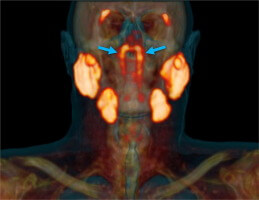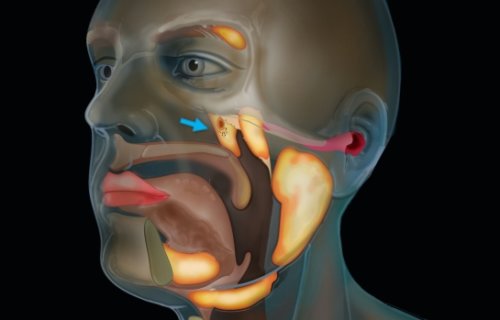AMSTERDAM, Netherlands — After centuries of practicing medicine, you’d think scientists would know every part of the human body, right? Researchers in the Netherlands say they’ve actually found a new organ behind the nose which seems to be an unknown set of salivary glands. Their study finds this could be a major breakthrough in preventing certain side-effects of cancer treatment.
Researchers at the Netherlands Cancer Institute were studying a new type of scan when they uncovered something in the back of the nasopharynx, behind the nasal cavity. This new type of cancer scan highlights salivary glands so doctors can spare these organs from radiation exposure. Oncologist Wouter Vogel and oral and maxillofacial surgeon Matthijs Valstar, who investigate the effects of cancer radiation on the head and neck, say they weren’t expecting anything to light up in this region.
“People have three sets of large salivary glands, but not there,” Vogel explains in a media release. “As far as we knew, the only salivary or mucous glands in the nasopharynx are microscopically small, and up to 1,000 are evenly spread out throughout the mucosa. So, imagine our surprise when we found these.”
Uncovering the ‘tubarial glands’

Working with colleagues at UMC Utrecht, the researchers discovered that all 100 prostate cancer patients who underwent the scan have this new organ. The PSMA PET/CT scan clearly marks the location of salivary glands in its images.
“The two new areas that lit up turned out to have other characteristics of salivary glands as well,” Valstar adds. The team also confirmed these readings with their own eyes after dissecting two human bodies during the research.
“We call them tubarial glands, referring to their anatomical location,” says Valstar.
Salivary glands make saliva and send them to your mouth through openings within your body. These organs are a vital part of chewing and swallowing and even help prevent infections in the mouth and throat.
Protecting this new organ from cancer treatment
While radiation therapy can have life-saving benefits for cancer patients, this treatment can also damage sensitive areas of the body too. Before making this discovery, Valstar and Vogel had been focusing on radiation’s effect while treating tumors in the throat or tongue.
“Radiation therapy can damage the salivary glands, which may lead to complications,” Vogel explains. “Patients may have trouble eating, swallowing, or speaking, which can be a real burden.”
Their study reveals these “new” glands are just as susceptible to radiation as the rest of the body’s salivary glands. The Dutch team examined over 700 patients who previously underwent radiation treatment to see how not protecting this organ affected their health. The results show more radiation exposure in this area created more complications for the patients after treatment.
Study authors are now hoping this discovery will benefit future cancer therapies by shielding this delicate area from radiation.
“For most patients, it should technically be possible to avoid delivering radiation to this newly discovered location of the salivary gland system in the same way we try to spare known glands,” Vogel concludes. “Our next step is to find out how we can best spare these new glands and in which patients. If we can do this, patients may experience less side effects which will benefit their overall quality of life after treatment.”
The study appears in the journal Radiotherapy & Oncology.
https://youtu.be/RHAyoQF09X4
